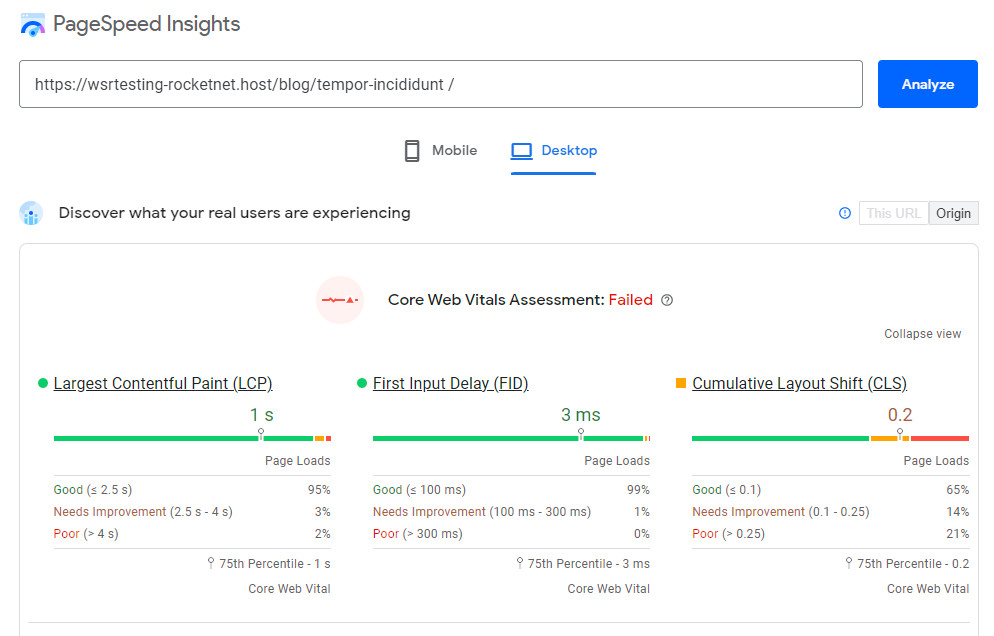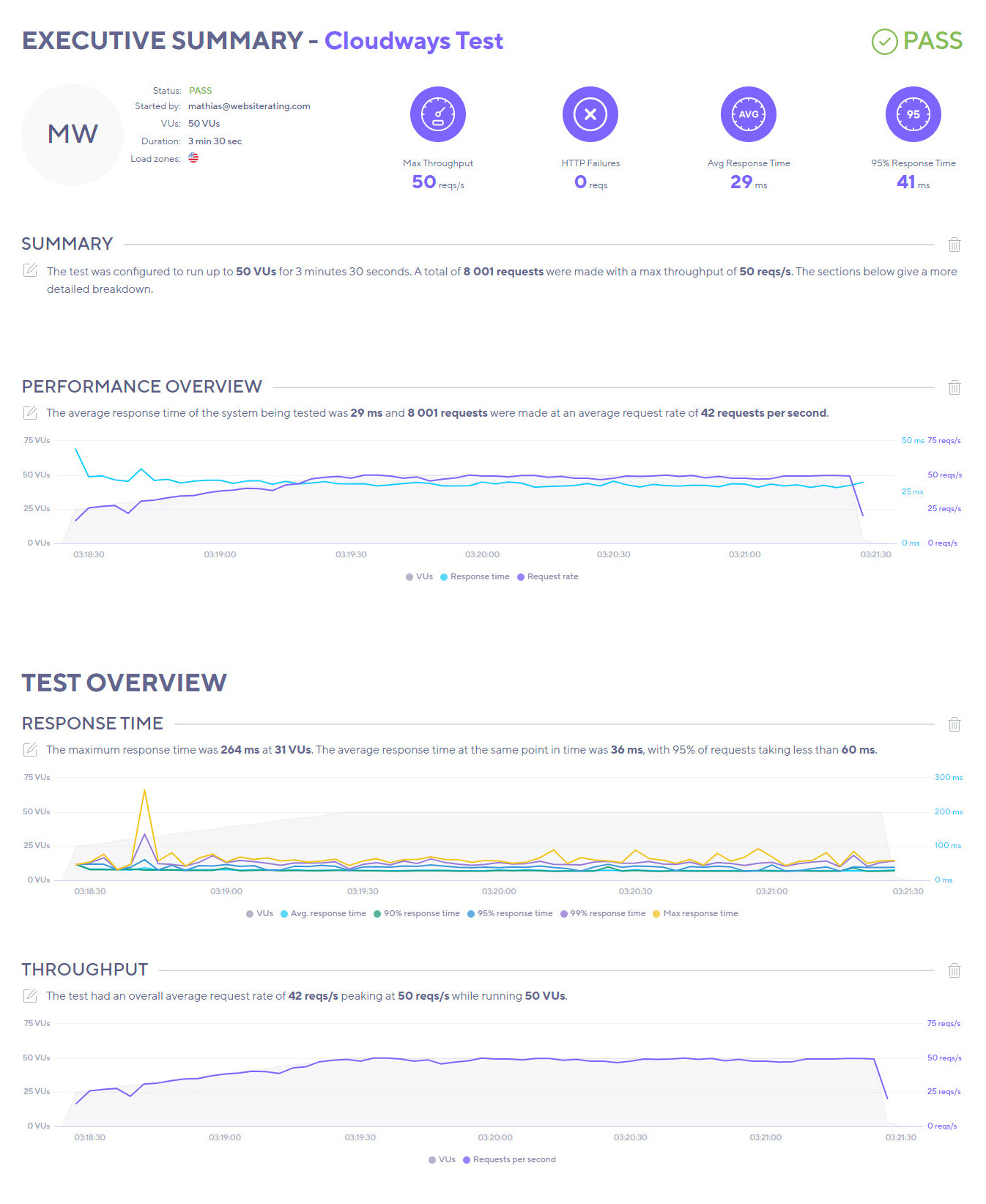This Rocket.net vs Cloudways comparison gives you a detailed, data-driven review of these two WordPress hosting providers across performance metrics to help you decide which service best meets your needs. Let’s dive into the specifics to understand how Rocket.net stacks up against Cloudways.
 Rocket.net |  Cloudways | |
|---|---|---|
| Pricing | From $25/month | From $11/month |
| SLA | 99.9% uptime | 99.9% uptime |
| Hosting types offered | Managed WordPress and WooCommerce. Reseller hosting. Enterprise hosting. | Managed WordPress and WooCommerce hosting. Managed cloud hosting. |
| Speed and performance | Cloudflare Enterprise. Built-in CDN WAF and edge caching. NVMe SSD storage. Unlimited PHP Workers. Free Redis & Object Cache Pro. | SSD storage. Brotli compression. PHP 8.0 and 8.1. Cloudflare Enterprise (add-on). HTTP/3, MariaDB, Memcache, Varnish. |
| WordPress | 1-click installs. Free site migration. Automatic updates. | 1-click installation. Auto-updating. 1-click staging. WP site cloning. Free site migration. |
| Servers | Apache + Nginx | Google Cloud. DigitalOcean. VULTR. Linode. AWS. |
| Security | Unlimited free SSL certificates. Automatic daily backups with 14-day retention. 100% PCI compliant. Full activity logs | Cloudflare DDoS protection. Free SSL certificates. Automatic daily backups. WAF. Malcare, Debian, HTTPS encryption. |
| Control Panel | Rocket.net (proprietary) | cPanel |
| Extra Goodies | 24/7 live chat and phone support | 24/7 support plus upgrade options |
| Money-back guarantee | 30 days | None |
| Current deal | 🔥 Ready for speed? Let Rocket do a FREE test migration for you! | 🔥 Get 10% OFF for 3 months using code WEBRATING |
The hardest part about hosting your website is choosing exactly where to host it. Hosting providers work hard to convince you that their platform is the best, but they can’t all take the top spot. Can they?
It’s true, there is a good number of top-notch WordPress hosting platforms out there. I know this because I’ve tried them all. Therefore, I see it as my duty to impart my newfound wisdom to you all so you can make an informed choice about which one to use.
Today we’re checking out Rocket.net and Cloudways. Both are rated highly and set the bar high in terms of features and performance.
But, there can only be one winner in this race, so let’s see who comes out on top.
Plans & Pricing
Let’s kick off this comparison by taking a look at what each platform charges for its hosting services. After all, a platform must be as affordable as it is powerful.
Rocket.net Pricing Plans
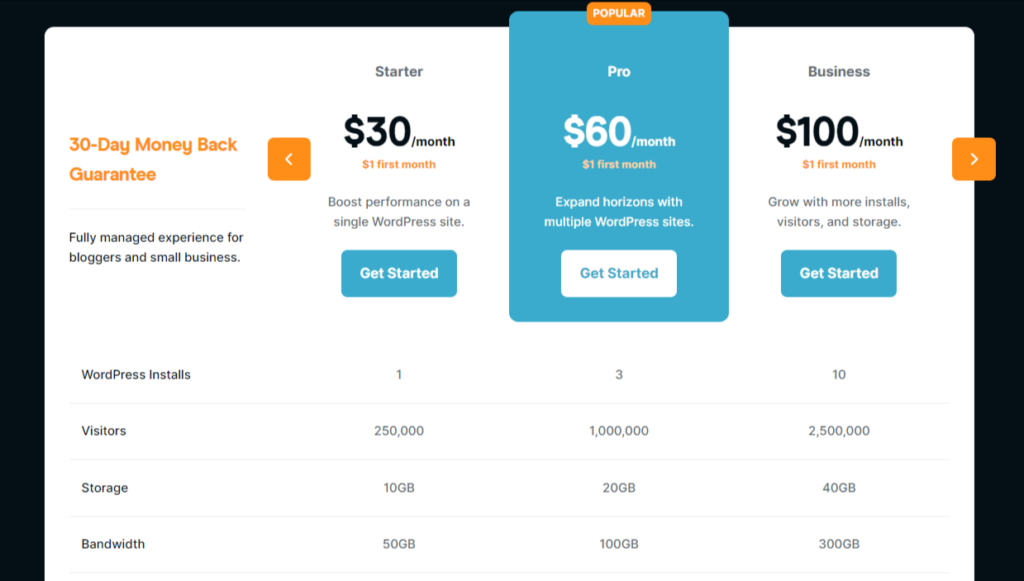
Rocket.net offers managed, agency, and enterprise hosting plans.
Managed hosting:
- Starter: $25/month; $1 the first month
- Pro: $50/month; $1 the first month
- Business: $83/month; $1 the first month
Agency hosting:
- Tier 1: $100 per month; $1 the first month
- Tier 2: $200 per month; $1 the first month
- Tier 3: $300 per month; $1 the first month
Enterprise hosting:
- Enterprise 1: $649 per month
- Enterprise 2: $1299 per month
- Enterprise 3: $1949 per month
While Rocket doesn’t provide a free trial it does gives an almost free trial. You can try out the platform for a month for a single dollar. Plus, even if you do pay full whack, you still have the reassurance of the 30-day money-back guarantee.
Visit Rocket.net for more information and their latest deals… or check out my review of Rocket.net here.
Cloudways Pricing Plans
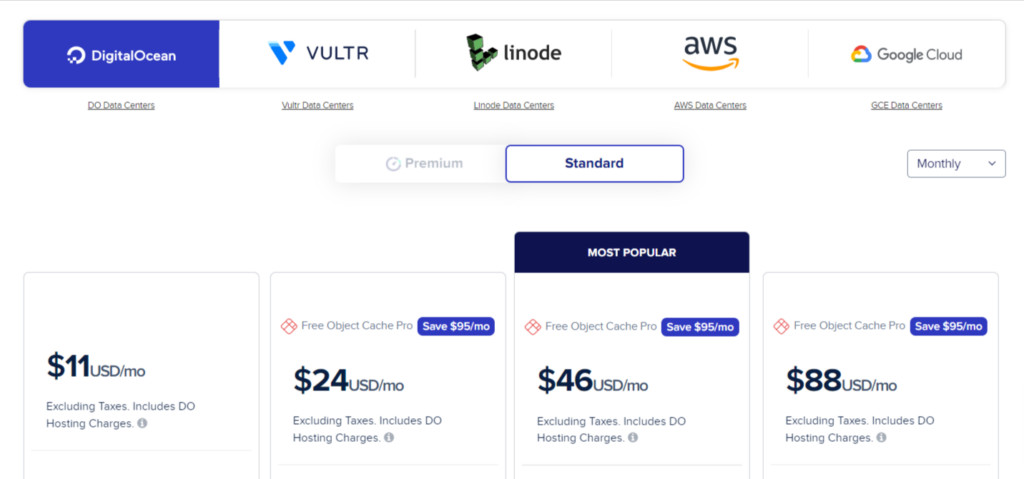
Cloudways’ pricing is somewhat complicated. Since the platform utilizes five data networks, it has created several price plans for each one resulting in a dizzying array of choices.
I recommend checking out each network’s coverage and data center locations before deciding which one to pick.
Here’s an overview of the pricing:
- DigitalOcean: From $11 – $99/month
- VULTR: $14 – $118/month
- Linode: $14 – $105/month
- AWS: $38.56 – $285.21/month
- Google Cloud: $37.45 – $241.62/month
One important thing to note is that you cannot pay annually. You can either pay monthly or hourly. And there’s no money-back guarantee, but there is a three-day free trial available for any plan.
Cloudways also has a couple of add-ons that are important to consider because they are features that you are likely to want (I’ll go into them in more detail later in this article):
- Cloudflare Enterprise CDN: $4.99/month per domain
- WordPress SafeUpdates: $3/month
Visit Cloudways for more information and their latest deals… or check out my review of Cloudways here.
🏆 Winner is Cloudways
Despite the add-on costs, Cloudways still comes out cheaper than Rocket.net. And when you get into the detail of each provider’s plan limits, you will quickly see that Cloudways has more generous limits for bandwidth and storage.
Performance, Speed & Reliability
Now, let’s see what type of power each platform can muster. This is vital if you want a fast-running and reliable website, as a clunky site will quickly convince visitors to leave and never return.
In this section, you will find out…
- Why site speed matters… a lot!
- How fast a site hosted on Rocket.net and Cloudways loads. We will test their speed and server response time against Google’s Core Web Vitals metrics.
- How a site hosted on Rocket.net and Cloudways performs with traffic spikes. We will test how they perform when faced with increased site traffic.
The most important performance metric that you should look for in a web host is speed. Visitors to your site expect it to load fast instant. Site speed not only affects user experience on your site, but it also affects your SEO, Google rankings, and conversion rates.
But, testing site speed against Google’s Core Web Vitals metrics isn’t enough on its own, as our testing site does not have substantial traffic volume. To evaluate the efficiency (or inefficiency) of the web host’s servers when faced with increased site traffic, we use a testing tool called K6 (formerly called LoadImpact) to send virtual users (VU) to our test site.
Why Site Speed Matters
Did you know that:
- Pages that loaded in 2.4 seconds had a 1.9% conversion rate.
- At 3.3 seconds, the conversion rate was 1.5%.
- At 4.2 seconds, the conversion rate was less than 1%.
- At 5.7+ seconds, the conversion rate was 0.6%.
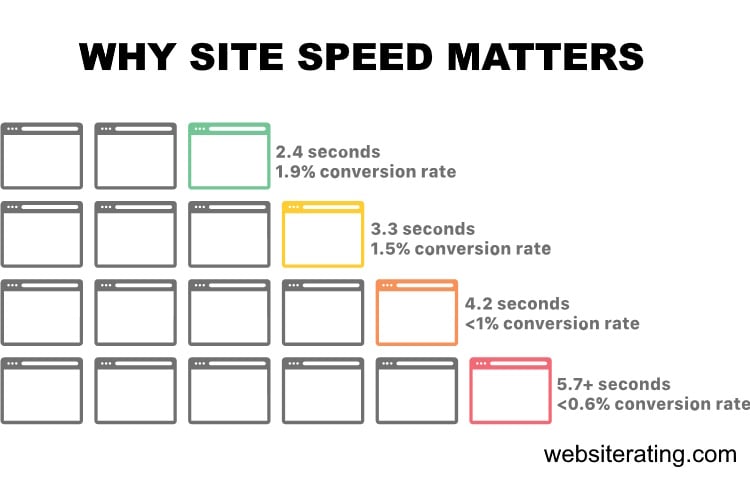
When people leave your website, you lose not only potential revenue but also all the money and time you spent generating traffic to your website.
And if you want to get to the first page of Google and stay there, you need a website that loads up fast.
Google’s algorithms prefer displaying websites that offer a great user experience (and site speed is a huge factor). In Google’s eyes, a website that offers a good user experience generally has a lower bounce rate and loads up fast.
If your website is slow, most visitors will bounce back, resulting in a loss in search engine rankings. Also, your website needs to load up fast if you want to convert more visitors into paying customers.

If you want your website to load up fast and secure the first spot in search engine results, you will need a fast web hosting provider with server infrastructure, CDN and caching technologies that are fully configured and optimized for speed.
The web host you choose to go with will significantly impact how fast your website loads.
How We Perform the Testing
We follow a systematic and identical process for all the web hosts we test.
- Buy hosting: First, we sign up and pay for the web host’s entry-level plan.
- Install WordPress: Then, we set up a new, blank WordPress site using the Astra WordPress theme. This is a lightweight multipurpose theme and serves as a good starting point for the speed test.
- Install plugins: Next, we install the following plugins: Akismet (for spam protection), Jetpack (security and backup plugin), Hello Dolly (for a sample widget), Contact Form 7 (a contact form), Yoast SEO (for SEO), and FakerPress (for generating test content).
- Generate content: Using the FakerPress plugin, we create ten random WordPress posts and ten random pages, each containing 1,000 words of lorem ipsum “dummy” content. This simulates a typical website with various content types.
- Add images: With the FakerPress plugin, we upload one unoptimized image from Pexels, a stock photo website, to each post and page. This helps evaluate the website’s performance with image-heavy content.
- Run the speed test: we run the last published post in Google’s PageSpeed Insights Testing tool.
- Run the load impact test: we run the last published post in K6’s Cloud Testing tool.
How We Measure Speed & Performance
The first four metrics are Google’s Core Web Vitals, and these are a set of web performance signals that are critical to a user’s web experience on both desktop and mobile devices. The last fifth metric is a load impact stress test.
1. Time to First Byte
TTFB measures the time between the request for a resource and when the first byte of a response begins to arrive. It’s a metric for determining the responsiveness of a web server and helps identify when a web server is too slow to respond to requests. Server speed is basically entirely determined by the web hosting service you use. (source: https://web.dev/ttfb/)
2. First Input Delay
FID measures the time from when a user first interacts with your site (when they click a link, tap a button, or use a custom, JavaScript-powered control) to the time when the browser is actually able to respond to that interaction. (source: https://web.dev/fid/)
3. Largest Contentful Paint
LCP measures the time from when the page starts loading to when the largest text block or image element is rendered on the screen. (source: https://web.dev/lcp/)
4. Cumulative Layout Shift
CLS measures unexpected shifts in the display of content in the loading of a web page due to image resizing, ad displays, animation, browser rendering, or other script elements. Shifting layouts lower the quality of the user experience. This can make visitors confused or require them to wait till the webpage loading is completed, which takes more time. (source: https://web.dev/cls/)
5. Load Impact
Load impact stress testing determines how the web host would handle 50 visitors simultaneously visiting the test site. Speed testing alone isn’t enough to test performance, as this test site doesn’t have any traffic to it.
To be able to evaluate the efficiency (or inefficiency) of a web host’s servers when faced with increased site traffic, we used a testing tool called K6 (formerly called LoadImpact) to send virtual users (VU) to our test site and stress test it.
These are the three load impact metrics we measure:
Average response time
This measures the average duration it takes for a server to process and respond to client requests during a specific test or monitoring period.
The average response time is a useful indicator of the overall performance and efficiency of a website. Lower average response times generally indicate better performance and a more positive user experience, as users receive quicker responses to their requests.
Maximum response time
This refers to the longest duration it takes for a server to respond to a client’s request during a specific test or monitoring period.This metric is crucial for evaluating the performance of a website under heavy traffic or usage.
When multiple users access a website simultaneously, the server must handle and process each request. Under high load, the server may become overwhelmed, leading to an increase in response times. The maximum response time represents the worst-case scenario during the test, where the server took the longest time to respond to a request.
Average request rate
This is a performance metric that measures the average number of requests per unit of time (usually per second) that a server processes.
The average request rate provides insights into how well a server can manage incoming requests under various load conditions. A higher average request rate indicates that the server can handle more requests in a given period, which is generally a positive sign of performance and scalability.
⚡Speed & Performance Test Results
The table below compares web hosting companies’ performance based on four key performance indicators: average Time to First Byte, First Input Delay, Largest Contentful Paint, and Cumulative Layout Shift. Lower values are better.
| Company | TTFB | Avg TTFB | FID | LCP | CLS |
|---|---|---|---|---|---|
| SiteGround | Frankfurt: 35.37 ms Amsterdam: 29.89 ms London: 37.36 ms New York: 114.43 ms Dallas: 149.43 ms San Francisco: 165.32 ms Singapore: 320.74 ms Sydney: 293.26 ms Tokyo: 242.35 ms Bangalore: 408.99 ms | 179.71 ms | 3 ms | 1.9 s | 0.02 |
| Kinsta | Frankfurt: 355.87 ms Amsterdam: 341.14 ms London: 360.02 ms New York: 165.1 ms Dallas: 161.1 ms San Francisco: 68.69 ms Singapore: 652.65 ms Sydney: 574.76 ms Tokyo: 544.06 ms Bangalore: 765.07 ms | 358.85 ms | 3 ms | 1.8 s | 0.01 |
| Cloudways | Frankfurt: 318.88 ms Amsterdam: 311.41 ms London: 284.65 ms New York: 65.05 ms Dallas: 152.07 ms San Francisco: 254.82 ms Singapore: 295.66 ms Sydney: 275.36 ms Tokyo: 566.18 ms Bangalore: 327.4 ms | 285.15 ms | 4 ms | 2.1 s | 0.16 |
| A2 Hosting | Frankfurt: 786.16 ms Amsterdam: 803.76 ms London: 38.47 ms New York: 41.45 ms Dallas: 436.61 ms San Francisco: 800.62 ms Singapore: 720.68 ms Sydney: 27.32 ms Tokyo: 57.39 ms Bangalore: 118 ms | 373.05 ms | 2 ms | 2 s | 0.03 |
| WP Engine | Frankfurt: 49.67 ms Amsterdam: 1.16 s London: 1.82 s New York: 45.21 ms Dallas: 832.16 ms San Francisco: 45.25 ms Singapore: 1.7 s Sydney: 62.72 ms Tokyo: 1.81 s Bangalore: 118 ms | 765.20 ms | 6 ms | 2.3 s | 0.04 |
| Rocket.net | Frankfurt: 29.15 ms Amsterdam: 159.11 ms London: 35.97 ms New York: 46.61 ms Dallas: 34.66 ms San Francisco: 111.4 ms Singapore: 292.6 ms Sydney: 318.68 ms Tokyo: 27.46 ms Bangalore: 47.87 ms | 110.35 ms | 3 ms | 1 s | 0.2 |
| WPX Hosting | Frankfurt: 11.98 ms Amsterdam: 15.6 ms London: 21.09 ms New York: 584.19 ms Dallas: 86.78 ms San Francisco: 767.05 ms Singapore: 23.17 ms Sydney: 16.34 ms Tokyo: 8.95 ms Bangalore: 66.01 ms | 161.12 ms | 2 ms | 2.8 s | 0.2 |
Rocket.net performs better than Cloudways.
For TTFB, Rocket.net has lower values in almost all locations compared to Cloudways, indicating a faster response time. For example, in Frankfurt, Rocket.net has a TTFB of 29.15 ms compared to 318.88 ms for Cloudways.
Rocket.net also has a lower average TTFB of 110.35 ms compared to Cloudways’ 285.15 ms.
For the FID, Rocket.net is again better, with a time of 3 ms compared to 4 ms from Cloudways.
The LCP of Rocket.net is lower (1 s) indicating faster rendering of large content compared to Cloudways (2.1 s).
However, for CLS, Cloudways has a lower score (0.16) than Rocket.net (0.2), indicating Cloudways’ web pages might be slightly more stable while loading.
Overall, with the exception of the CLS, Rocket.net outperforms Cloudways across all the other metrics.
⚡Load Impact Test Results
The table below compares web hosting companies’ performance based on three key performance indicators: Average Response Time, Highest Load Time, and Average Request Time. Lower values are better for Average Response Time and Highest Load Time, while higher values are better for Average Request Time.
| Company | Avg Response Time | Highest Load Time | Avg Request Time |
|---|---|---|---|
| SiteGround | 116 ms | 347 ms | 50 req/s |
| Kinsta | 127 ms | 620 ms | 46 req/s |
| Cloudways | 29 ms | 264 ms | 50 req/s |
| A2 Hosting | 23 ms | 2103 ms | 50 req/s |
| WP Engine | 33 ms | 1119 ms | 50 req/s |
| Rocket.net | 17 ms | 236 ms | 50 req/s |
| WPX Hosting | 34 ms | 124 ms | 50 req/s |
Again, Rocket.net outperforms Cloudways!
Rocket.net has an average response time of 17 ms, which is significantly better than Cloudways’ average response time of 29 ms.
Rocket.net also outperforms Cloudways in terms of highest load time with a time of 236 ms, compared to Cloudways’ time of 264 ms.
However, both Rocket.net and Cloudways tie in average request time, handling 50 requests per second.
So, while Rocket.net seems to offer quicker response times, both companies appear equally capable in terms of handling a large number of requests per second.
Rocket.net Performance Features
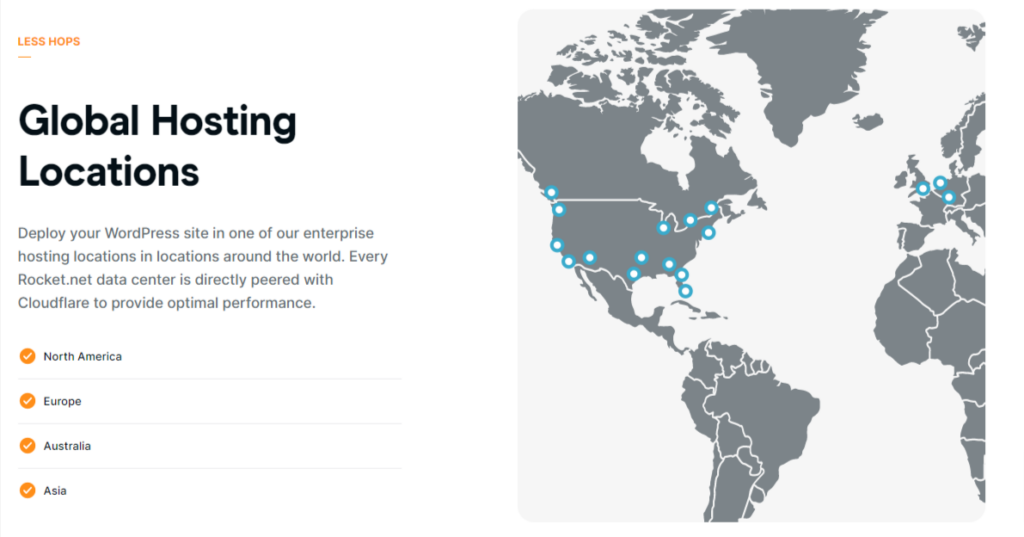
Rocket’s whole ethos is providing ultra-fast speeds and reliability to its customers, and it does this by utilizing Cloudflare enterprise technology and the “Edge of the Cloud.” This makes use of 32 CPU cores with NVMe physical servers distributed across the globe and over 275 PoP locations within the world’s biggest cities.
What exactly does “Edge of the Cloud” mean? Well, without overloading you with technical jargon, it essentially means that data is delivered to a site visitor via the nearest PoP location.
Because there is far less distance to travel, the data experience far less lag and much faster delivery speeds. This also explains why the PoP locations are situated in populous cities – it makes sense to place them in areas with the most users.
This setup has an additional advantage. Each “Edge of the Cloud” exchange has a direct connection to a local ISP. This further boosts performance and is extra effective in reducing latency even further.
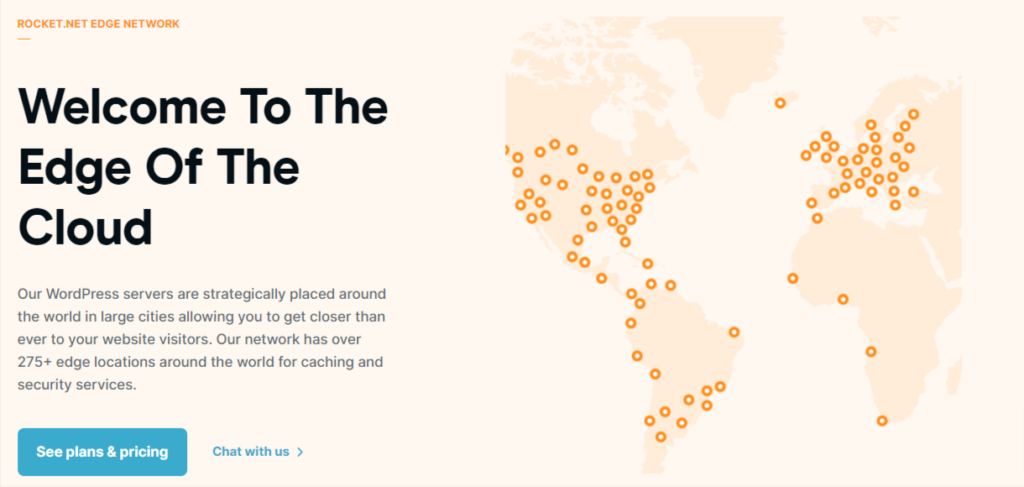
Rocket.net is pretty clever tech. To ensure the best possible performance, the system will automatically optimize and pre-configure your site setup.
This feature is good news for those who would rather bury their heads in the sand than deal with anything too technical. It’s a great time saver and ensures your website is always running at its best.
This automation is all thanks to the use of Cloudflare CDN, which is included as standard with every plan. This is seriously powerful, enterprise-grade software that equips your site with the following:
- Argo smart routing
- Polish image optimization
- Brotli file compression
- Early hints (giving up to 30% faster speeds)
These tools are top-grade and work together to ensure you get the fastest data serving speeds and unbeatable reliability.
Let’s not forget caching – a vital component of website speed and performance. Rocket does not disappoint here either and makes use of its stellar PoP network to deliver a number of high-performing cache features:
- Full page caching
- Automatic image optimization
- ARGO smart routing
- Cookie cache bypass
- Tiered caching
- Per device caching
- Free Redis and Object Cache Pro (Fully-Managed Cache & Database-As-A-Service)

We’re still not done! Rocket has a couple more tricks up its sleeve. Remember, you have the enterprise NVMe SSD storage which is extremely robust and reliable.
Rocket also guarantees you can use the latest version of Litespeed PHP. So, 8.0 and 8.1 are not a problem here.
All in all, Rocket claims that its setup is 2 – 3 x faster than the Google Cloud network. And I know that Google is already extremely speedy. So if Rocket can go faster than that, you’re onto a winner.
Cloudways Performance Features
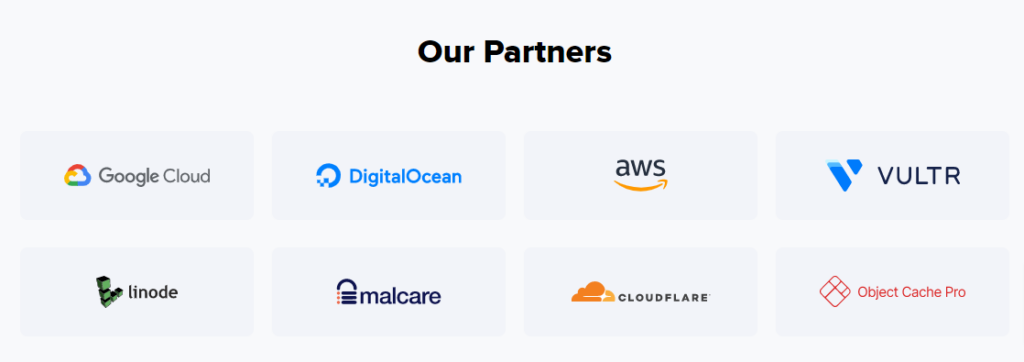
Like Rocket.net, Cloudways has an impressive infrastructure network but with an original twist. Rather than utilize a single cloud platform, it actually has five at your disposal. However, you can’t use all five at once, you must pick one and subscribe to a relevant plan.
How do you know which one is best? Well, check out the physical data center locations to see how big each network is and whether or not there’s a data center close to your location. Additionally, each network has plans designed for different user types, from individuals to enterprises.
Here are the five IaaS providers you can pick from:
- Digital Ocean
- VULTR
- Linode
- Google Cloud platform
- AWS
The network totals over 65 data centers overall, of which 21 are situated in the US.
Next, we meet the mighty “Thunderstack.” This is what Cloudways has aptly named its own infrastructure. But is it as impressive as its name?
This tech has been precision tuned and optimized to deliver stunning reliability and speeds. While it uses NGINX servers for its standard hosting (these are top of their class and responsible for powering over 40% of the world’s websites), if you’re using the platform for WordPress, you get access to Apache HTTP servers.
Why the difference in servers? While Apache is less recent than NGINX it is better equipped to deal with internal dynamic content and also has multi-processing modules resulting in a much higher level of stability and security.
No matter which servers you’re accessing, you can also choose between MySQL and MariaDB databases and pick which ones are best for you.
Cloudways doesn’t cheap out on the caching software. Rather than have its own proprietary caching tools, it uses a number of third-party applications.
First up, you get Varnish Cache which is capable of up to 10 x faster loading speeds.
The system also features Memcache. This is high-quality software with high-powered in-memory data storage. This is incredibly effective at reducing database load and speeding up dynamic web content.
You also get PHP-FPM advanced PHP caching software and Redis. The PHP caching is capable of increasing site speed by up to 300% while Redis further enhances speed and performance through its in-memory storage facility.
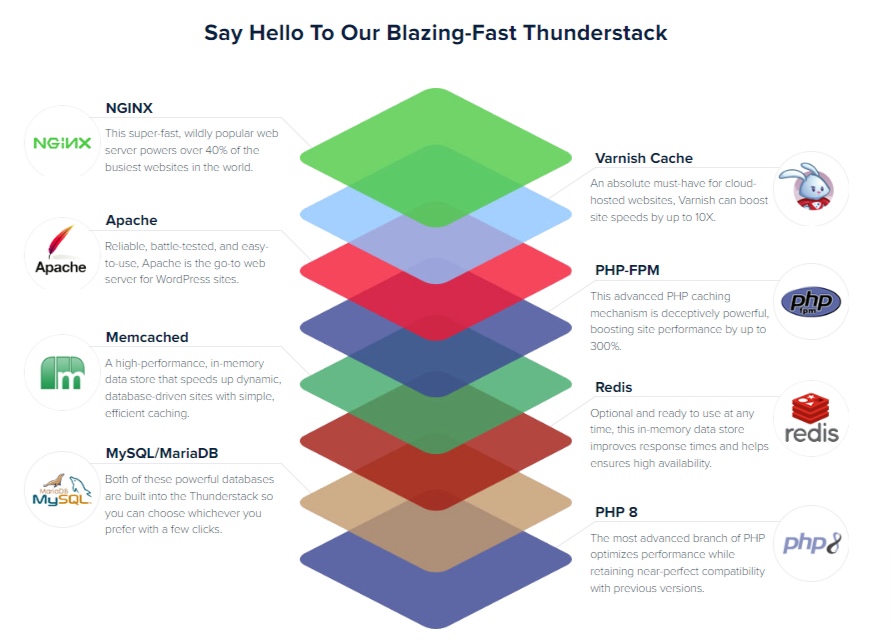
Here’s something I’m less impressed with. You get a standard CDN with all plans, but if you want to access the premium Cloudflare CDN, you’ll have to pay extra for it.
According to all the platforms I’ve researched, this is unusual as most other providers include it in the price.
To be honest, I’m less bothered by the cost itself, I just find all these add-ons a pain to deal with and much prefer them to be included in the monthly subscription price.
And considering that Cloudways Cloudflare Enterprise CDN is an additional $4.99/month PER domain, this cost can quickly add up.
Trust me, you are going to want this add-on. Cloudflare is the Rolls Royce of CDNs. Its multi-tiered cache serves up data fast while reducing latency and also bandwidth costs. Plus, you also get:
- Brotli compression
- Cloudflare’s WAF
- Priority HTTP3 support
- Priority DDoS protection
- Brotli compression
- Polish simple image optimization
- Mirage mobile optimization
- Free Wildcard SSL
To round off this section (I mean, we’ve covered a lot) here’s the remainder of what you get to ensure great speed and reliability:
- SSD storage drives for 3 x faster performance
- Auto-healing managed cloud servers
- PHP 8 compatible servers
- Dedicated resource environment
🏆 Winner is Rocket.net
Rocket.net outperforms Cloudways in multiple critical aspects related to speed, performance, and load impact.
In terms of speed and response times, Rocket.net delivers superior results, as evidenced by its lower Time to First Byte (TTFB) across various global locations. It also has a lower Average Time to First Byte (Avg TTFB). These metrics demonstrate that Rocket.net is typically faster in starting to deliver data in response to a request. Rocket.net also boasts a lower First Input Delay (FID) and a more expedient Largest Contentful Paint (LCP), indicating a swifter site interactivity and rendering of significant page content respectively.
Regarding performance, Rocket.net showcases its strength through its faster Average Response Time and lower Highest Load Time. These metrics imply that Rocket.net servers are quicker to respond to requests on average and maintain this speed even under high load conditions.
When examining load impact, while both Rocket.net and Cloudways have an equal Average Request Time, meaning they can handle the same number of requests per second, Rocket.net’s lower Highest Load Time demonstrates that it manages heavy traffic more efficiently.
Did you know that Rocket.net also came out as the #1 winner in our test of WordPress hosting companies?
Security Features
Now, we’re going to dive into security. The best infrastructure on the planet is no good if the security is lax. And since malicious attacks are only going to increase, you need something robust and impenetrable.
Rocket.net Security Features
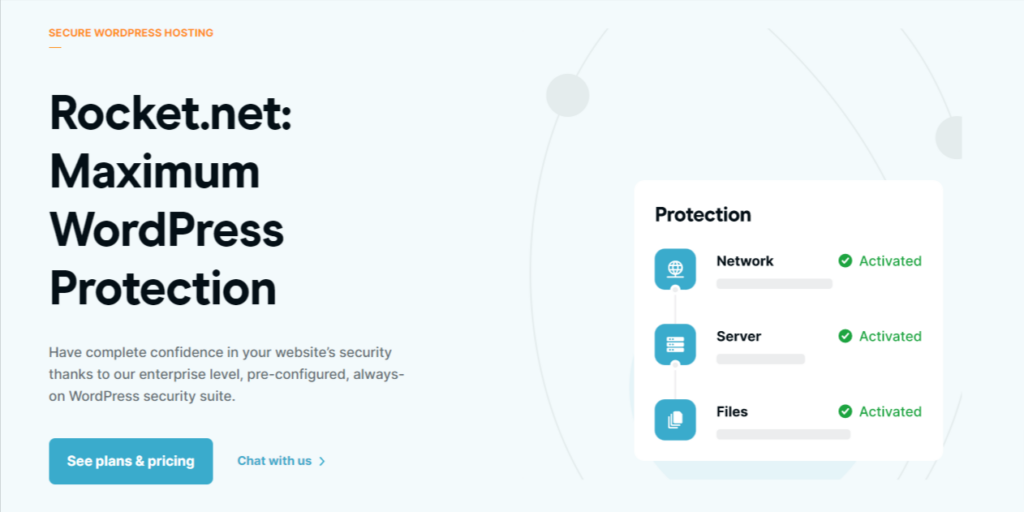
Rocket.net doesn’t let you down in the security department. It has comprehensive and high-quality tech to keep you and your WordPress sites safe and sound. This makes it highly unlikely for anything malicious to creep in.
In the event that something does crop up, you can quickly revert back to a safe version of your site thanks to the daily backup and 14-day backup retention service. Additionally, you can also enjoy the following security features:
- Enterprise-level security preconfigured and automatically optimized
- Cloudflare enterprise WAF
- Automatic updates and bug patching
- Full activity logging
- 100% PCI compliant
- Malicious threat detection and elimination
- Imunify360 – real-time malware scanning with zero performance impact
- Unlimited free SSL certificates
Cloudways Security Features
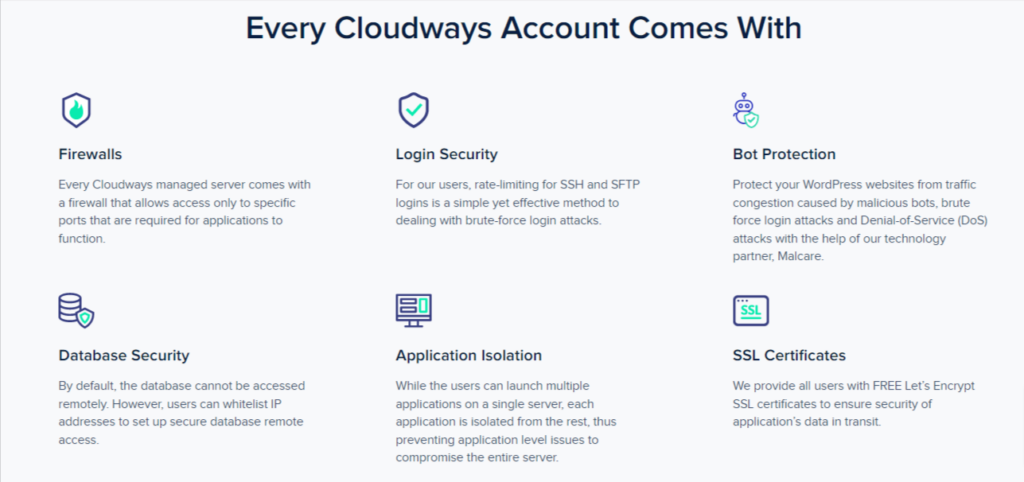
Even something called “Thunderstack” requires top-level security. And Cloudflare certainly packs a punch in this department, especially considering you get this long list of features:
- Cloudflare enterprise-grade security
- Free SSL certificates
- Web Application Firewall (WAF)
- Malcare
- Remote database security
- Application isolation
- 2-factor authentication
- HTTPS protocol end-to-end encryption
- Debian issue detection and patching
- DDoS attack mitigation in under three seconds
- rate-limiting for SSH and SFTP logins
- GDPR Compliance
- Suspicious device login control
- Automatic backups with 1-click restore
- BugCrowd Bug Bounty (crowdsourced vulnerability spotting)
But wait, there’s another add-on cost! *Sigh*
Alright, so it only costs an extra $3/month, but again, that is PER domain, so if you have multiple sites and opt for Cloudflare CDN, too, you can see how this quickly becomes expensive.
Here’s what you get for your $3:
- Automatic updates
- Automatic backups
- Automated update testing and deployment
- Core Web Vitals check
- Email notifications
🏆 Winner is Rocket.net
It’s a close call because both platforms provide excellent security. The reason Rocket gets my vote is that everything is included in the price. I don’t see why WordPress users should have to fork out extra for additional security features.
Technical Support
Finally, I’ll get stuck into each platform’s support levels. I feel that responsive and swift customer support is vital. Although we’re dealing with sophisticated technology, it’s still common to encounter issues. And if your website suffers downtime as a result, then that’s going to negatively impact your business.
Rocket.net Support
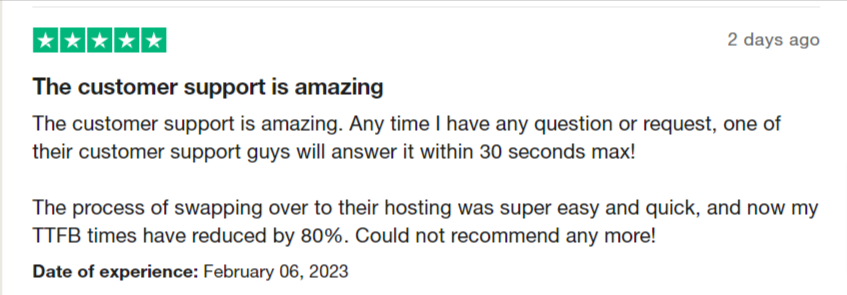
Customers rave about Rocket’s customer service. This much is evident when you read the reviews on sites like Trustpilot and Capterra.
On the surface, it doesn’t look that special. You get 24/7 live chat support, email ticketing support, plus you can call the team. But here’s what makes it so good. Their response times are some of the fastest I’ve ever experienced.
I had to wait mere moments for a response via live chat, and when I called them, I only waited about 30 seconds until I got through to a human.
Furthermore, the customer service channels are operated by experienced and knowledgeable people. In most cases, your queries can be resolved on the spot, and you don’t have to waste time waiting for your query to be escalated up the food chain.
In short, it’s nothing but exceptional here.
Cloudways Support
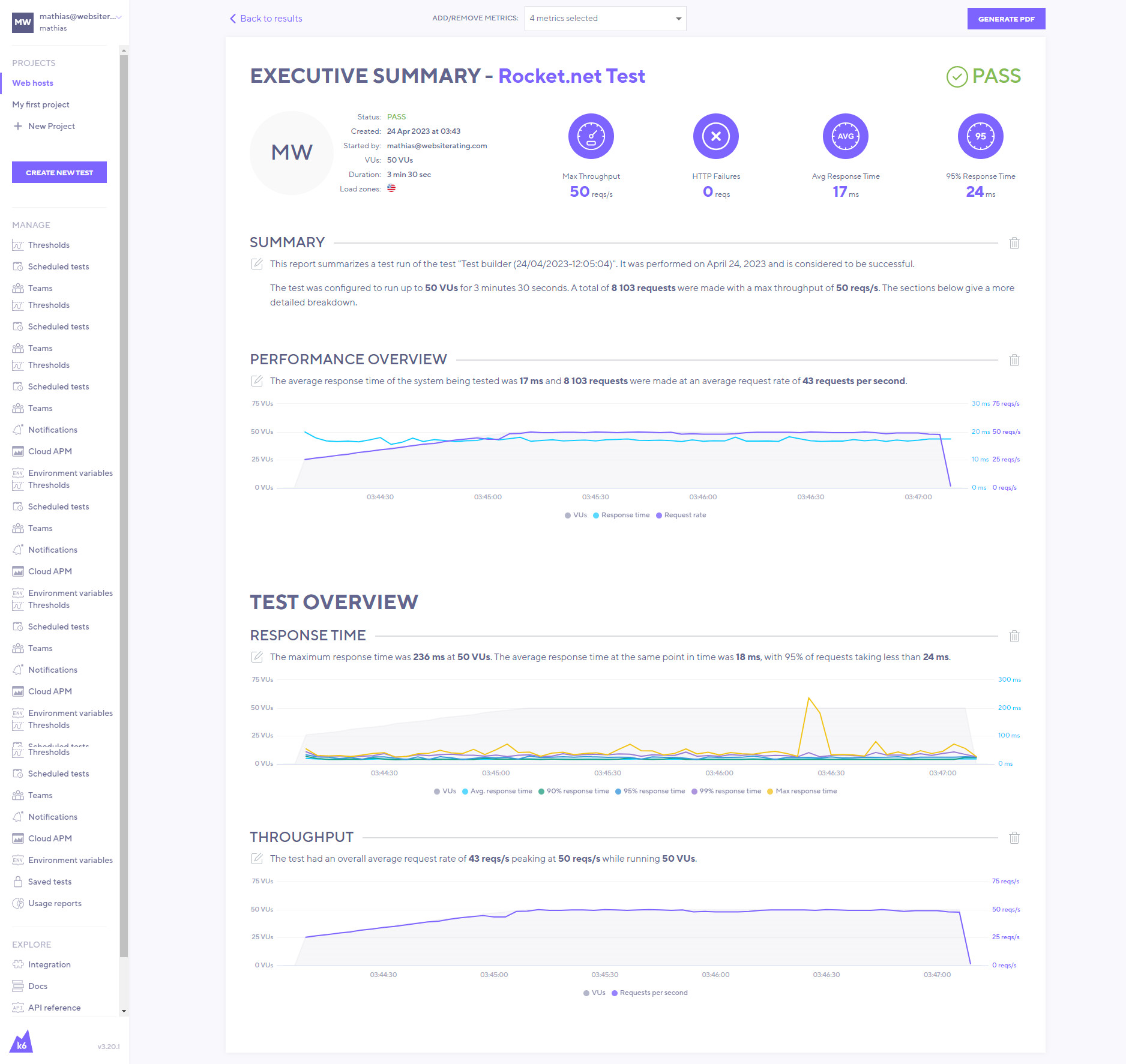
Cloudways gives you a choice from three levels of customer service. And in typical Cloudways fashion, the two higher levels cost extra. That said, the standard level that comes with all price plans is probably more than adequate for most people.
All plans provide (at no extra cost) 24/7/365 live chat support plus a 24/7 email ticketing service. And you also get the following:
- Guided platform and infrastructure support
- Proactive performance bot alerts.
If you want to level up your customer service, you can do so for the following prices. I’d say this is really only necessary if you are a large business or enterprise:
- $100/month: Faster response times and customization support
- $500/month: Immediate response times, private Slack channel, phone support, and access to senior support members
I gave the standard service a run for its money and waited around three minutes for a live chat reply. It’s certainly not as good as Rocket’s response result, but it’s still perfectly adequate.
🏆 Winner is Rocket.net
I’m not going to argue with the legions of Rocket’s customer support fans. It’s clear that Rocket genuinely cares about providing amazing support rather than simply claiming to do so.
It’s very seldom that a part of a software platform is flawless, but in this case, Rocket has achieved it.
Our Verdict ⭐
In our comprehensive comparison of Rocket.net and Cloudways across pricing, speed and performance, security, and support, Rocket.net consistently outperformed in most categories.
Rocket.net shone for its impressive speed, superior performance, robust security measures, and exceptional customer support. These advantages position Rocket.net as a high-quality choice for those who prioritize fast, secure, and well-supported hosting services.
However, Cloudways stood out for its competitive pricing, offering a more budget-friendly alternative. While the cost-effective nature of Cloudways is appealing, it’s important to weigh these savings against Rocket.net’s superior offerings in all other categories.
Grow your business with lightning-fast, secure and fully-optimized websites that are easy to set up & manage.
- Free Cloudflare Enterpris SSL, CDN, WAF
- Free Malware Protection
- 24x7 Expert Support & Unlimited Free Migrations
So there you go. Rocket.net is the winner 🏆
Recent Improvements & Updates
Rocket.net and Cloudways are constantly updating and building out their WordPress hosting features. Here below are some of the most recent updates (last checked January 2025).
Cloudways product updates
- DigitalOcean Premium Servers: Cloudways has introduced DigitalOcean Premium Servers with 32 GB, enhancing their cloud hosting experience. This upgrade represents a significant improvement in their infrastructure, offering higher performance and reliability.
- Varnish Enhancements: Device Detect: Cloudways has enhanced their Varnish caching technology with device detection capabilities. This update optimizes caching by tailoring it to different devices, improving loading times and overall site performance.
- PHP-FPM Performance Tuning Guide: Cloudways released a detailed guide on PHP-FPM Performance Tuning, demonstrating their commitment to speed and efficiency. This guide is a valuable resource for users looking to optimize their technology stack for better performance.
- New WordPress Vulnerability Scanner: In response to a critical security flaw in Elementor Pro, Cloudways introduced a new WordPress Vulnerability Scanner. This tool helps in identifying and mitigating potential security risks in WordPress sites.
- Cloudways Cron Optimizer for WordPress: Recognizing the challenges posed by Cron Jobs, Cloudways launched a Cron Optimizer for WordPress. This tool simplifies and enhances the management of Cron Jobs, improving website functionality.
- Cloudways Autoscale for WordPress: The new Cloudways Autoscale feature for WordPress offers flexible hosting solutions. It allows users to choose their infrastructure provider, ensuring scalability and adaptability to changing website demands.
- Easier Domain Names Management: Cloudways has simplified domain name management on their platform, aligning with their mission to make cloud technology accessible and easy to use for web professionals and SMBs.
- PHP 8.1 Availability: Cloudways worked on ensuring the smooth integration of PHP 8.1 on their servers, focusing on providing the latest technology for improved performance.
- WooCommerce Speed Up Challenge: Cloudways hosted the biggest Hackathon event, the WooCommerce Speed Up Challenge, celebrating speed optimization in eCommerce.
Rocket.net product updates
- Cloudflare Edge Analytics for WordPress: This new feature leverages Cloudflare’s robust analytics at the edge, providing WordPress users with deeper insights into their website traffic and performance. This integration allows for real-time data collection, offering a more comprehensive understanding of user interactions.
- Enhanced Automated WordPress Backup Restores: The backup restore functionality has been upgraded for greater reliability and ease of use. Users can now effortlessly restore their WordPress sites from backups with improved speed and accuracy, minimizing downtime and data loss risks.
- The Best WordPress Activity Logging Without Plugin Bloat: Rocket.net introduces a lightweight solution for WordPress activity logging. This innovation eliminates the need for additional plugins, reducing the bloat on your WordPress site while still providing comprehensive logs of all site activities.
- Rocket.net Smart Caching – Taking CloudFlare Enterprise EDGE Caching To The Next Level: Rocket.net’s Smart Caching utilizes Cloudflare’s advanced caching capabilities to deliver even faster website loading times and improved overall performance, enhancing user experience and SEO.
How We Evaluate Web Hosts: Our Methodology
When we review web hosts, our evaluation is based on these criteria:
- Value for Money: What types of web hosting plans are on offer, and are they good value for money?
- User Friendliness: How user-friendly is the signup process, the onboarding, the dashboard? and so on.
- Customer Support: When we need help, how quickly can we get it, and is the support effective and helpful?
- Hosting Features: What unique features does the web host provide, and how do they stack up against competitors?
- Security: Are essential security measures like SSL certificates, DDoS protection, backup services, and malware/virus scans included?
- Speed and Uptime: Is the hosting service fast and reliable? What types of servers do they use, and how do they perform in tests?
For more details on our review process, click here.

